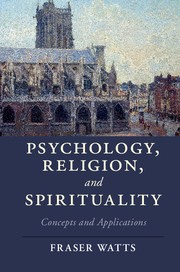Book contents
- Frontmatter
- Dedication
- Contents
- Preface
- 1 Concepts and Approaches
- 2 Psychoanalysis
- 3 Genetics and Evolution
- 4 Brain and Cognition
- 5 Religious Experience
- 6 Religious Practices
- 7 Religious Beliefs and Thinking
- 8 Spirituality
- 9 Developmental Aspects
- 10 Varieties and Types
- 11 Health and Adjustment
- 12 Personal Transformation
- 13 Scripture and Doctrine
- 14 Human Nature and Personality
- 15 Summing-Up
- Further Reading
- References
- Index
13 - Scripture and Doctrine
Published online by Cambridge University Press: 31 March 2017
- Frontmatter
- Dedication
- Contents
- Preface
- 1 Concepts and Approaches
- 2 Psychoanalysis
- 3 Genetics and Evolution
- 4 Brain and Cognition
- 5 Religious Experience
- 6 Religious Practices
- 7 Religious Beliefs and Thinking
- 8 Spirituality
- 9 Developmental Aspects
- 10 Varieties and Types
- 11 Health and Adjustment
- 12 Personal Transformation
- 13 Scripture and Doctrine
- 14 Human Nature and Personality
- 15 Summing-Up
- Further Reading
- References
- Index
Summary
This chapter will focus on how psychology can be used to help understand religious doctrine, especially its personal and human significance. It will focus specifically on Christian doctrine, as an example, though parallel remarks can be made about doctrine in other faith traditions. We will look first at the contribution of psychology to the interpretation of scripture.
Psychology and Scripture
An important religious application of psychology involves using it as a tool for the interpretation of scripture. There has long been considerable interest in the use of the social sciences in biblical interpretation, but more recently there has been growing interest in the use of psychology. Wayne Rollins (1999) provided a helpful overview of such work, and the four volumes of Psychology and the Bible edited by Ellens and Rollins (2004) provide a good sample of some of the better work. Rollins and Kille (2007) have edited a helpful anthology.
It is often assumed that psychological exegesis is bad exegesis, as the leading Testament scholar, Gerd Theissen, acknowledges in his impressive psychological study of St. Paul (Theissen, 1987). I submit that that need not be the case; it is not difficult to set out guidelines for avoiding the worst pitfalls of psychological exegesis.
First, psychological exegesis should build on what is known in biblical scholarship generally about the texts being interpreted. If it ignores that, or gets it wrong, it will be unconvincing. Second, it should recognize that psychology is diverse and contains different subdisciplines. Various approaches to psychology may elucidate different aspects of a passage of scripture. Both of those points are well illustrated by Theissen in his work on St. Paul. For each passage of St. Paul that he considers, he first does a text analysis and then a “tradition analysis,” giving a survey of issues that have been raised in the interpretation of the passage. Only then does he bring in psychology, and when he does so, he looks at the passage from three psychological perspectives: learning theory, psychodynamic psychology, and cognitive psychology.
Using a variety of psychological perspectives also helps guard against another pitfall with psychological exegesis, which is making overconfident claims. Particular problems arise with claims made on the basis of psychoanalysis, which itself has a somewhat problematic status, as we saw in Chapter 2.
- Type
- Chapter
- Information
- Psychology, Religion, and SpiritualityConcepts and Applications, pp. 160 - 171Publisher: Cambridge University PressPrint publication year: 2017



